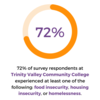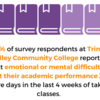In the middle of fall of 2022, the only basic needs support we offered at Trinity Valley Community College in Texas was a simple food pantry with a clothing closet. Students would drop by every so often, but we didn't do much outreach to make them aware of its existence. By the middle of 2023, however:
Our vice president of student services created a taskforce called, “The Whole Student Approach.”
Our Board of Trustees approved a new Associate VP position called, “Associate Vice President of Student Advocacy,” a position tasked with championing holistic student support initiatives.
Our new president advocated for an increase in comprehensive wraparound services at an event on campus sponsored by the local chapter of the National Alliance of Mental Illness.
Here’s how we turned the tide.

Over the years, we've seen so many students suffer. I always knew there was support we should provide to students, but we simply didn’t—or didn’t know how.
During the spring of 2022, over 50 students dropped courses due to mental health or personal issues. Just last month, one student was suddenly kicked out of their home and had to move to another city to stay with friends. They did not have nearby shelter or transportation to class. Another student, in the same week, couldn’t attend classes because their child had a health emergency.
In the fall of 2022, an opportunity was thrown my way. Our grant coordinator called a last-minute meeting with several different departments to tell us about the availability of the Texas Higher Education Coordinating Board’s Student Success Acceleration Program implementation grant (SSAP-IG), a state program designed to fund evidence-based student success programs. I convinced everyone in that meeting that we should focus our grant proposal on basic needs/wraparound services.
Everyone looked at me a bit skeptically. “Okay, Melinda," they said. "Then you can write it.”
I wrote my first grant application in four days. My vision was to expand our basic food pantry and clothing closet to a wraparound advocacy approach and case management service. I saw other schools in the state, such as Amarillo College, adopt this approach and their students were flourishing. It's no surprise that their graduation rates increased significantly. When I learned that our grant proposal was accepted with an award of $178,000, I was elated. But then came the work.
With HIP’s guidance, I decided I was no longer going to be a passive “watcher” and “complainer." I was determined to educate the campus community so that our administration would support our imperative work.

Melinda Berry
Associate Vice President of Student Advocacy, Trinity Valley Community College
The grant requirements were daunting. When I attended the very first community of practice meeting sponsored by the Texas Higher Ed Coordinating Board and Institute for Higher Education Policy (IHEP), we were all informed we would be receiving “technical providers” based on our grant program.
Admittedly, I rolled my eyes. What is this going to do for us? I thought.
Then came our first coaching call as part of the Hope Impact Partnerships (HIP). It felt like Trinity Valley was the only college without a program supported by their institution. By this time, most of the institutions had already committed to continuing to support their grant program with their own institutional funds. This was not something our administration had given any consideration to in the past and the general consensus was that they would not support an initiative like this at that time. But I was determined that we could and should do something.

In my second HIP coaching call, I laid all my frustrations on the table. I explained we have all the passion, but no administrative understanding. It was then that Joshua Williams, a former practitioner-researcher on the HIP team at The Hope Center, asked an important question: “Who is your champion?” My colleague and I could only answer in frustration. “No one,” we said. “No one, but each other.”
Josh listened and worked with us on a customized plan to advocate for our students at TVCC. With HIP’s guidance, I decided I was no longer going to be a passive “watcher” and “complainer." I was determined to educate the campus community so that our administration would support our imperative work.
Josh talked to us about his days of writing grants to support his university programs and gave us specific, actionable advice. For example, he advised us to always bring a faculty member and a student to a meeting in which we’re asking our college for support of a grant effort. My anger quickly turned to excitement. I truly felt we had a chance if we followed the path that he helped us chart.

HIP is full of basic needs heroes. We received so many amazing ideas from other institutions in the HIP community such as Alamo College, who partners with their local Starbucks to use donated leftover pastries to offer a “pop up” snack cart to students. They were all so willing to share ways in which they supported their basic needs programs, and that informed our own. The Hope Center’s “Basic Needs Taskforce” guide gave us the ability to go forward in creating our taskforce. I began recruiting faculty whenever and wherever I could.
Since then, we’ve made so many incredible strides toward supporting our students. In addition to the wins above, I’ve also been able to share the message widely. My recent presentation “Connection to Completion: Supporting the Holistic Student” was attended by over 60 faculty members and staff. In preparing for the presentation, I used The Hope Center’s Learning modules and data from our participation in the Spring 2023 Survey of Basic Needs.
HIP is full of basic needs heroes. We received so many amazing ideas from other institutions in the HIP community such as Alamo College, who partners with their local Starbucks to use donated leftover pastries to offer a “pop up” snack cart to students.

Melinda Berry
Associate Vice President of Student Advocacy, Trinity Valley Community College
Finally, HIP gave me the courage to advocate for myself in doing this important work. Shortly after participating in HIP, I applied for that new Associate Vice President of Advocacy position—and I got it! In this new role, I am better positioned to take all that HIP offered and get students the support they deserve.
My advice to fellow administrators struggling to get a program off the ground: Don't give up! Keep trying. Keep educating and enlisting others, even when it seems dismal.
I get tears and chills when I speak about being part of HIP, and how much we have grown as an institution. Investing in students' basic needs security matters. And it works.


